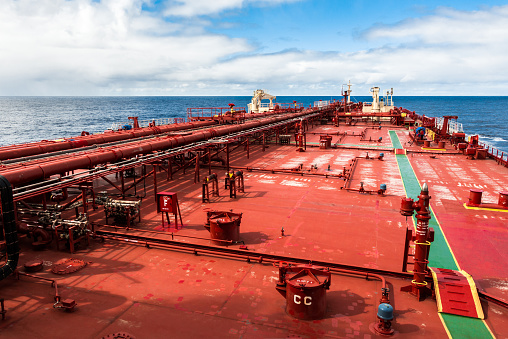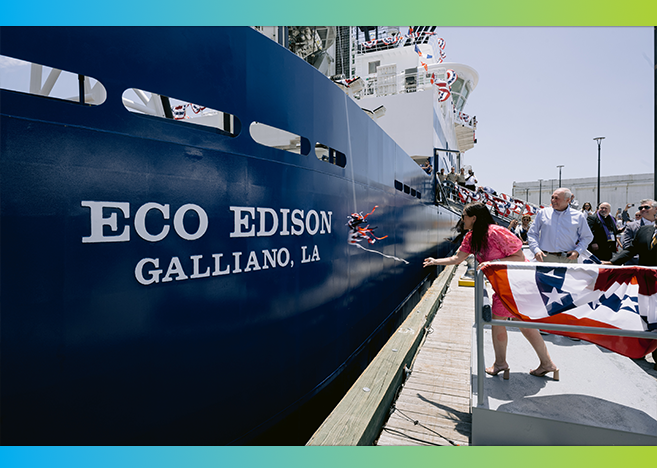When this article was first published, the 2016 Amendments to the Maritime Labour Convention (MLC) had just entered into force. These amendments encouraged flag states to consider harassment and bullying when addressing occupational safety and health risks and conducting investigations.
Since then, the maritime industry has made important progress in protecting seafarers from shipboard harassment and bullying. The 2025 Amendments to the MLC will make it mandatory for flag states to ensure policies and measures are in place onboard ships to prevent and resolve cases of shipboard violence and harassment, including sexual harassment, bullying and sexual assault. Flag states should also consider putting in place similar measures for recruitment and placement services established in their territories. Initiatives such as the IMO’s ‘My Harassment-Free Ship’ campaign, as well as the forthcoming updates to the STCW Code, which include mandatory anti-harassment training, reflect a growing global commitment to safer and more inclusive shipboard environments. The International Chamber of Shipping (ICS) has also introduced a comprehensive set of industry principles aimed at eliminating harassment and bullying, underscoring the importance of collaboration among shipowners, flag states, and seafarers’ representatives.
Harassment and bullying remain common
Despite the progress, far too many seafarers are still likely to be bullied or harassed at work. In a survey among seafarers conducted by the Norwegian Maritime Authority (NMA) in 2023, as many as 27% stated that they had been bullied or harassed in the last 12 months. 2% of the respondents had experienced sexual harassment, which increased to 15% among the 400 female respondents. A member survey conducted by Nautilus International in 2021 showed similar concerning results, with 28% of its members reporting that they had experienced bullying or harassment onboard, rising to 42% who had witnessed bullying or harassment onboard.
By updating this article, we hope to contribute to the ongoing discussion about harassment and bullying at sea, and to inspire long-term awareness and proactive action in order to safeguard the health and wellbeing of seafarers.
A tough and lonely profession
Preventing offensive or hurtful behavior between colleagues is important in all workplaces, but perhaps even more so at sea. Seafaring is characterized by demanding physical working conditions, potentially hazardous tasks, long hours of work and high levels of stress and fatigue. Seafaring is also described as a ‘lonely life’. Not only are seafarers away from family and friends for very long periods of time, many seafarers live isolated lives while onboard. Crew members may have very different cultural and ethnic backgrounds and the organizational, and associated social, structure onboard is usually strongly hierarchical. An increasing degree of automation onboard ships has led to smaller crews, which means that the team onboard is even more vulnerable and dependent on good collaboration.
Gard’s experience
At Gard we deal with seafarers’ health issues every day. Indeed, crew claims are one of the most frequently occurring types of maritime claims, as outlined in our recent Gard Crew Claims Report 2025. Our data show that illnesses related to abdominal and cardiovascular conditions top the list of causes for repatriating seafarers. But data only gives limited insight into the actual working conditions and safety culture onboard. Could diagnoses such as ‘abdominal pain’ and ‘chest pain’ in some cases reflect a person’s reduced mental wellbeing from being bullied at work? Could a ‘broken finger’ be reported as a ‘slip, trip and fall incident’ to cover-up physical abuse by a fellow crew member?
Unfortunately, claims data does not enable us to quantify the extent and consequences of harassment and bullying onboard ships. However, we do know that there are seafarers out there with some upsetting stories to tell and seafarer surveys clearly indicate that there is room for improvement.
Recognizing harassment and bullying
Violence and harassment in the world of work refers to a range of unacceptable behaviors and practices that aim at, result in, or are likely to result in physical, psychological, sexual or economic harm, and include gender-based violence and harassment. The terms harassment and bullying are often used interchangeably, but the ICS and International Transport Workers’ Federation (ITF) ‘Guidance on eliminating shipboard harassment and bullying’ (ICS-ITF Guidance), which is also referenced in the MLC, explains them as follows: “Harassment is a form of discrimination which has the purpose or effect of violating the dignity of a person and of creating an intimidating, hostile, degrading, humiliating or offensive environment.”
“Bullying is a form of harassment that includes hostile or vindictive behavior, which can cause the recipient to feel threatened or intimidated.” threatened or intimidated.”
It is worth noting that harassment and bullying:
- can take a wide variety of forms, ranging from use of offensive language, rude gestures, spreading malicious rumours and making unwelcome sexual advances, to various forms of physical aggression resulting in serious injuries,
- does not only happen face to face. The increasing availability of electronic communication has created a potentially powerful means to harass, embarrass, humiliate, threaten, or intimidate individuals. This has become known as ‘cyber-bullying’,
- can be between two individuals or it may involve groups of people. It can be officers who bully a crew member of a lower rank, or it can occur between crew members of the same rank,
- might be obvious or insidious. A working relationship described as a ‘personality-clash’ or individuals described as ‘over-sensitive’, ‘unable to see a joke’ or ‘having an attitude problem’, could sometimes be excuses for behavior that involve ‘hidden’ bullying, and
- can occur unwittingly, rather than as a result of any deliberate malign intention. In some cases, those committing acts of harassment and bullying may be unaware of the impact their behavior has on others. However, this is no excuse and may still constitute harassment or bullying. Most people will agree on extreme cases of harassment and bullying but it is sometimes the ‘grey areas’ that cause the most problems. Some ship operators prefer to provide examples of what is unacceptable behavior in their organization, and many relevant examples are provided in the ICS-ITF Guidance. However, for all practical purposes, if a seafarer complains of being harassed or bullied, he or she has a grievance which must be dealt with regardless of whether or not the complaint meets with a standard definition.
We encourage our members and clients to foster a working environment in which seafarers can work free of harassment and bullying.
A first step for shipowners and operators is to review all relevant regulatory requirements, the ICS Industry Principles, and the ICS-ITF Guidance, then to:
- ensure that they have a clearly written policy statement on the elimination of harassment and bullying,
- identify the standards of behavior expected of seafarers and make sure that officers and superintendents have the necessary skills to lead by example,
- maintain fair procedures for dealing promptly with complaints from seafarers, and
- carry out regular communication, training and awareness sessions. A written policy will only eliminate harassment and bullying in the workplace if it is supported by positive action to put it into practice.
- are familiar with and follow company procedures,
- know to whom they can turn if they have a work-related problem,
- respect appropriate standards of behavior, and
- report if they experience harassment and bullying or observe such behavior directed to others.




